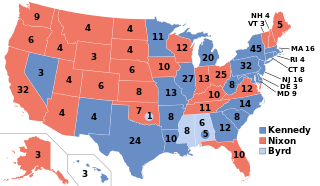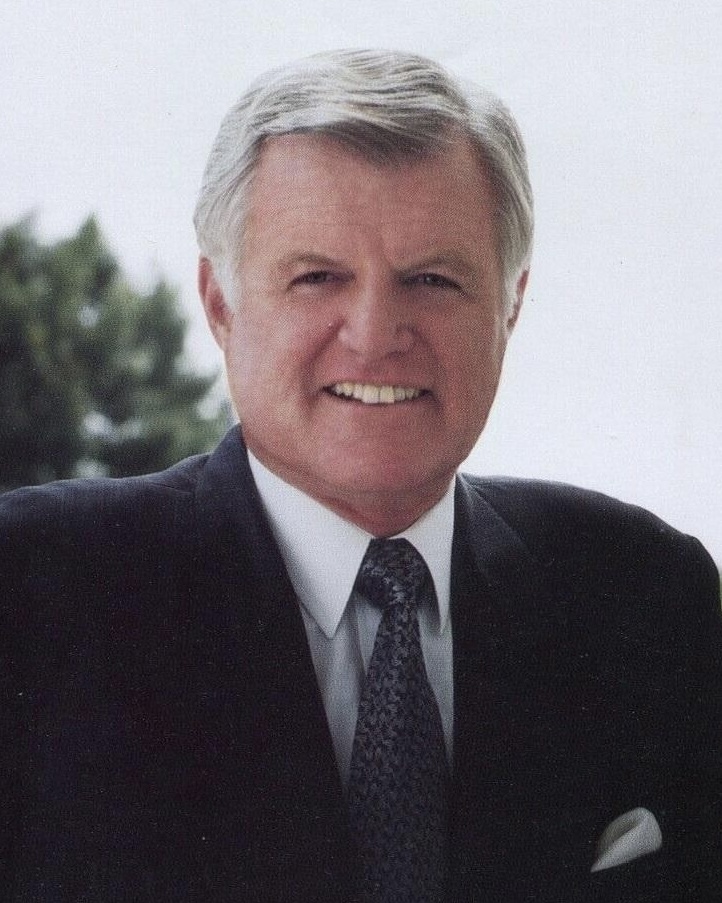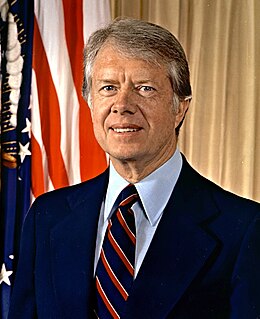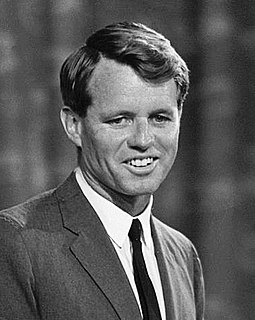
The 1960 United States presidential election was the 44th quadrennial presidential election. It was held on Tuesday, November 8, 1960. In a closely contested election, Democrat United States Senator John F. Kennedy defeated incumbent Vice President Richard Nixon, the Republican Party nominee. This was the first election in which fifty states participated and the last in which the District of Columbia did not. It was also the first election in which an incumbent president was ineligible to run for a third term because of the term limits established by the 22nd Amendment. It is also the last election where the losing candidate won Ohio.

The Twenty-sixth Amendment to the United States Constitution prohibits the states and the federal government from using age as a reason for denying the right to vote to citizens of the United States who are at least eighteen years old. It was proposed by Congress on March 23, 1971, and ratified on July 1, 1971, the quickest ratification of an amendment in history.

Edward Moore Kennedy was an American politician who served as a U.S. Senator from Massachusetts for almost 47 years, from 1962 until his death in 2009. A member of the Democratic Party and the Kennedy political family, he was the second most senior member of the Senate when he died and is the third-longest-continuously-serving senator in United States history. Kennedy was a brother of President John F. Kennedy and U.S. Attorney General and U.S. Senator Robert F. Kennedy—both victims of assassination—and was the father of Congressman Patrick J. Kennedy.

Robert Francis Kennedy Jr. is an American environmental attorney, author, and opponent of vaccination. Kennedy is a son of Robert F. Kennedy and nephew of former president John F. Kennedy. He is the president of the board of Waterkeeper Alliance, a non-profit environmental group that he helped found in 1999.

Joseph Patrick Kennedy II is an American businessman, Democratic politician, and a member of the Kennedy family.

Spinal and bulbar muscular atrophy (SBMA), popularly known as Kennedy's disease, is a progressive debilitating neurodegenerative disorder resulting in muscle cramps and progressive weakness due to degeneration of motor neurons in the brainstem and spinal cord.
The Kennedy Slide of 1962, also known as the Flash Crash of 1962, is the term given to the stock market decline from December 1961 to June 1962 during the Presidential term of John F. Kennedy. After the market experienced decades of growth since the Wall Street Crash of 1929, the stock market peaked during the end of 1961 and plummeted during the first half of 1962. During this period, the S&P 500 declined 22.5%, and the stock market did not experience a stable recovery until after the end of the Cuban Missile Crisis. The Dow Jones Industrial Average fell 5.7%, down 34.95, the second-largest point decline then on record.

The South Asian Stone Age covers the Palaeolithic, Mesolithic and Neolithic periods in South Asia. Evidence for the most ancient anatomically modern Homo sapiens in South Asia has been found in the cave sites of Cudappah of India, Batadombalena and Belilena in Sri Lanka. In Mehrgarh, in what is today western Pakistan, the Neolithic began c. 7000 BCE and lasted until 3300 BCE and the first beginnings of the Bronze Age. In South India, the Mesolithic lasted until 3000 BCE, and the Neolithic until 1400 BCE, followed by a Megalithic transitional period mostly skipping the Bronze Age. The Iron Age began roughly simultaneously in North and South India, around c. 1200 to 1000 BCE.

John Fitzgerald Kennedy, often referred to by his initials JFK and Jack, was an American politician who served as the 35th president of the United States from January 1961 until his assassination in November 1963. Kennedy served at the height of the Cold War, and the majority of his work as president concerned relations with the Soviet Union and Cuba. A Democrat, Kennedy represented Massachusetts in the U.S. House of Representatives and Senate prior to becoming president.

The 1994 United States Senate election in Massachusetts was held November 8, 1994. Incumbent Democratic U.S. Senator Ted Kennedy won re-election to his sixth full term, defeating the Republican nominee, businessman Mitt Romney. Romney was later elected Governor of Massachusetts in 2002, was the Republican nominee for President of the United States in 2012, in which he lost the presidency to then-incumbent President Barack Obama, and ultimately a U.S. Senator from Utah in 2018, 24 years later.

The 1980 Democratic presidential primaries were the selection process by which voters of the Democratic Party chose its nominee for President of the United States in the 1980 U.S. presidential election. Incumbent President Jimmy Carter was again selected as the nominee through a series of primary elections and caucuses culminating in the 1980 Democratic National Convention held from August 11 to August 14, 1980, in New York City.
Edward Shirley Kennedy (1817–1898) was an English mountaineer and author, and a founding member of the Alpine Club.

Friendship is a relationship of mutual affection between people. It is a stronger form of interpersonal bond than an association, and has been studied in academic fields such as communication, sociology, social psychology, anthropology, and philosophy. Various academic theories of friendship have been proposed, including social exchange theory, equity theory, relational dialectics, and attachment styles.

Klinefelter syndrome (KS), also known as 47, XXY is the set of symptoms that result from two or more X chromosomes in males. The primary features are infertility and small poorly functioning testicles. Often, symptoms may be subtle and many people do not realize they are affected. Sometimes, symptoms are more prominent and may include weaker muscles, greater height, poor coordination, less body hair, breast growth, and less interest in sex. Often it is only at puberty that these symptoms are noticed. Intelligence is usually normal; however, reading difficulties and problems with speech are more common. Symptoms are typically more severe if three or more X chromosomes are present.

Robert Francis Kennedy, sometimes referred to by the initials RFK, was an American politician and lawyer who served as the 64th United States Attorney General from January 1961 to September 1964, and as a U.S. Senator from New York from January 1965 until his assassination in June 1968. Kennedy, like his brothers John and Edward, was a prominent member of the Democratic Party and has come to be viewed by some historians as an icon of modern American liberalism.
Glyptoconus is a genus of air-breathing land snails, terrestrial pulmonate gastropod mollusks in the family Streptaxidae.
The Hunt Commission or Commission on Presidential Nominations was a commission set up in 1981 by the Democratic Party in the United States in order to change the way that the party selected its presidential candidate. The commission was chaired by then-North Carolina Governor James Hunt.

Joseph Patrick Kennedy III is an American lawyer and politician serving as the U.S. Representative for Massachusetts's 4th congressional district since 2013. A member of the Democratic Party, he represents a congressional district that extends from the western suburbs of Boston to the state's South Coast. A son of former Representative Joseph P. Kennedy II, he worked as a Peace Corps volunteer and as an assistant district attorney in the Cape and Islands and Middlesex County, Massachusetts offices before his election to Congress.

Jean Ann Kennedy Smith is an American diplomat, activist, humanitarian, and author who served as United States Ambassador to Ireland from 1993 to 1998. She is a member of the Kennedy family, the eighth of nine children and youngest daughter born to Joseph P. Kennedy and Rose Fitzgerald, and is their last surviving and longest-lived child. Her siblings included President John F. Kennedy, Senator Robert F. Kennedy, Senator Ted Kennedy, and Special Olympics founder Eunice Kennedy Shriver.

The United States presidential election in Alabama, 1960 was held on November 8, 1960, as part of that year's national presidential election. Eleven Democratic electors were elected, of whom six voted for Harry F. Byrd and five for John F. Kennedy.
















